The Cambridge History of China. Vol. 06. Alien Regimes and Border States, 907-1368
Подождите немного. Документ загружается.

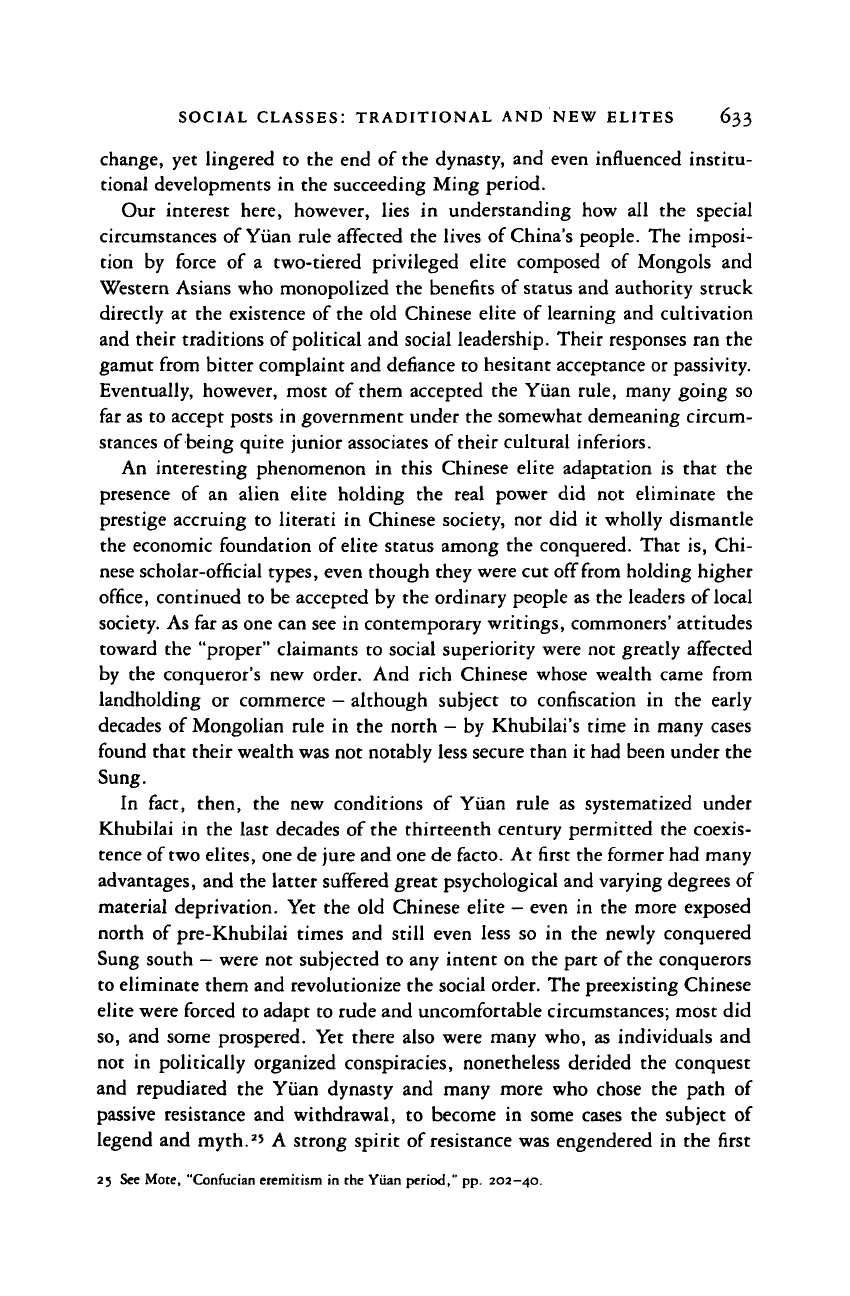
SOCIAL CLASSES: TRADITIONAL AND NEW ELITES 633
change, yet lingered to the end of the dynasty, and even influenced institu-
tional developments in the succeeding Ming period.
Our interest here, however, lies in understanding how all the special
circumstances of Yiian rule affected the lives of China's people. The imposi-
tion by force of a two-tiered privileged elite composed of Mongols and
Western Asians who monopolized the benefits of status and authority struck
directly at the existence of the old Chinese elite of learning and cultivation
and their traditions of political and social leadership. Their responses ran the
gamut from bitter complaint and defiance to hesitant acceptance or passivity.
Eventually, however, most of them accepted the Yiian rule, many going so
far as to accept posts in government under the somewhat demeaning circum-
stances of being quite junior associates of their cultural inferiors.
An interesting phenomenon in this Chinese elite adaptation is that the
presence of an alien elite holding the real power did not eliminate the
prestige accruing to literati in Chinese society, nor did it wholly dismantle
the economic foundation of elite status among the conquered. That is, Chi-
nese scholar-official types, even though they were cut off from holding higher
office, continued to be accepted by the ordinary people as the leaders of local
society. As far as one can see in contemporary writings, commoners' attitudes
toward the "proper" claimants to social superiority were not greatly affected
by the conqueror's new order. And rich Chinese whose wealth came from
landholding or commerce
—
although subject to confiscation in the early
decades of Mongolian rule in the north
—
by Khubilai's time in many cases
found that their wealth was not notably less secure than it had been under the
Sung.
In fact, then, the new conditions of Yiian rule as systematized under
Khubilai in the last decades of the thirteenth century permitted the coexis-
tence of two elites, one de jure and one de facto. At first the former had many
advantages, and the latter suffered great psychological and varying degrees of
material deprivation. Yet the old Chinese elite - even in the more exposed
north of pre-Khubilai times and still even less so in the newly conquered
Sung south
—
were not subjected to any intent on the part of the conquerors
to eliminate them and revolutionize the social order. The preexisting Chinese
elite were forced to adapt to rude and uncomfortable circumstances; most did
so,
and some prospered. Yet there also were many who, as individuals and
not in politically organized conspiracies, nonetheless derided the conquest
and repudiated the Yiian dynasty and many more who chose the path of
passive resistance and withdrawal, to become in some cases the subject of
legend and myth.
25
A strong spirit of resistance was engendered in the first
25 See Mote, "Confucian eremitism in the Yiian period," pp. 203-40.
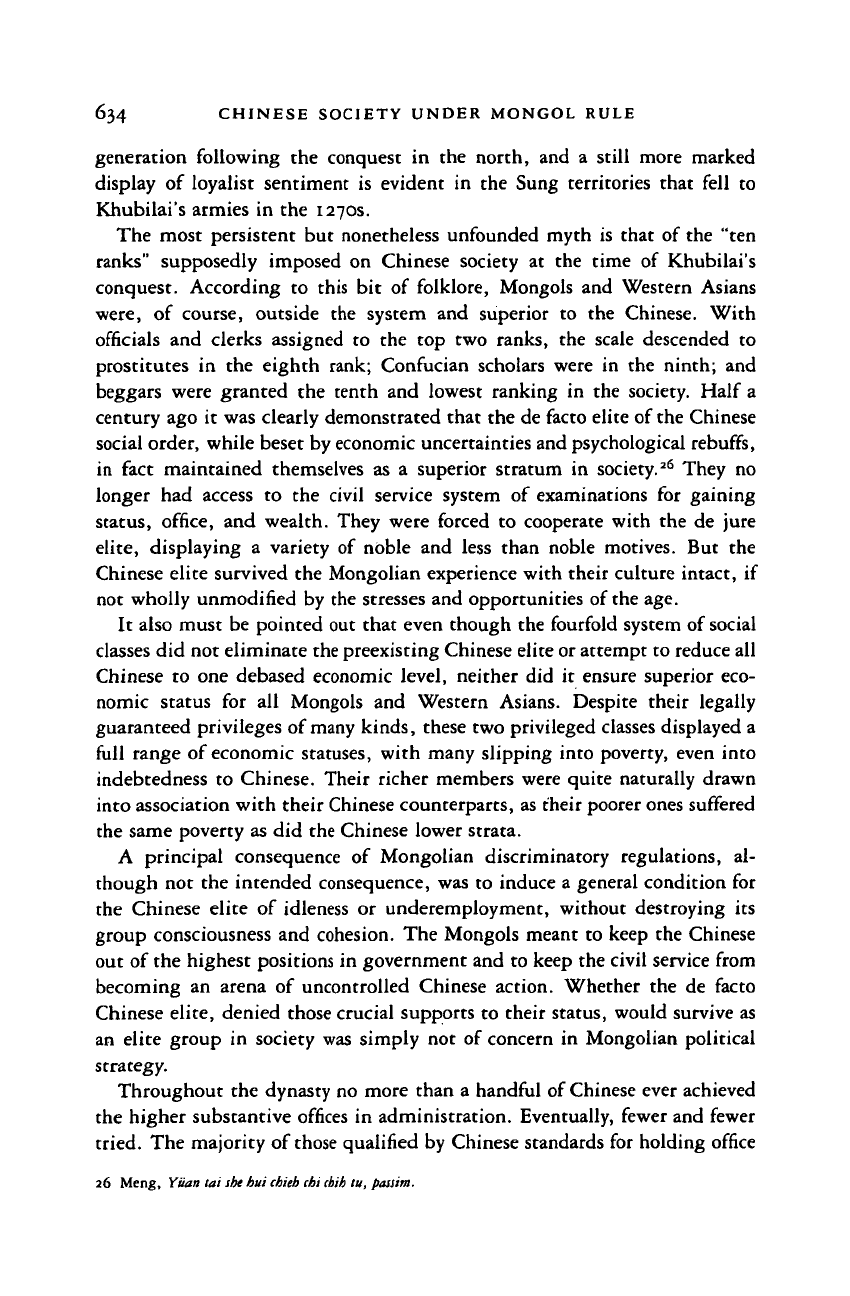
634 CHINESE SOCIETY UNDER MONGOL RULE
generation following the conquest in the north, and a still more marked
display of loyalist sentiment is evident in the Sung territories that fell to
Khubilai's armies in the 1270s.
The most persistent but nonetheless unfounded myth is that of the "ten
ranks"
supposedly imposed on Chinese society at the time of Khubilai's
conquest. According to this bit of folklore, Mongols and Western Asians
were, of course, outside the system and superior to the Chinese. With
officials and clerks assigned to the top two ranks, the scale descended to
prostitutes in the eighth rank; Confucian scholars were in the ninth; and
beggars were granted the tenth and lowest ranking in the society. Half a
century ago it was clearly demonstrated that the de facto elite of the Chinese
social order, while beset by economic uncertainties and psychological rebuffs,
in fact maintained themselves as a superior stratum in society.
26
They no
longer had access to the civil service system of examinations for gaining
status,
office, and wealth. They were forced to cooperate with the de jure
elite,
displaying a variety of noble and less than noble motives. But the
Chinese elite survived the Mongolian experience with their culture intact, if
not wholly unmodified by the stresses and opportunities of the age.
It also must be pointed out that even though the fourfold system of social
classes did not eliminate the preexisting Chinese elite or attempt to reduce all
Chinese to one debased economic level, neither did it ensure superior eco-
nomic status for all Mongols and Western Asians. Despite their legally
guaranteed privileges of
many
kinds, these two privileged classes displayed a
full range of economic statuses, with many slipping into poverty, even into
indebtedness to Chinese. Their richer members were quite naturally drawn
into association with their Chinese counterparts, as their poorer ones suffered
the same poverty as did the Chinese lower strata.
A principal consequence of Mongolian discriminatory regulations, al-
though not the intended consequence, was to induce a general condition for
the Chinese elite of idleness or underemployment, without destroying its
group consciousness and cohesion. The Mongols meant to keep the Chinese
out of the highest positions in government and to keep the civil service from
becoming an arena of uncontrolled Chinese action. Whether the de facto
Chinese elite, denied those crucial supports to their status, would survive as
an elite group in society was simply not of concern in Mongolian political
strategy.
Throughout the dynasty no more than a handful of Chinese ever achieved
the higher substantive offices in administration. Eventually, fewer and fewer
tried. The majority of
those
qualified by Chinese standards for holding office
26 Meng, Yuan tai
she
hui
chieb
cbi
cbih
tu, passim.
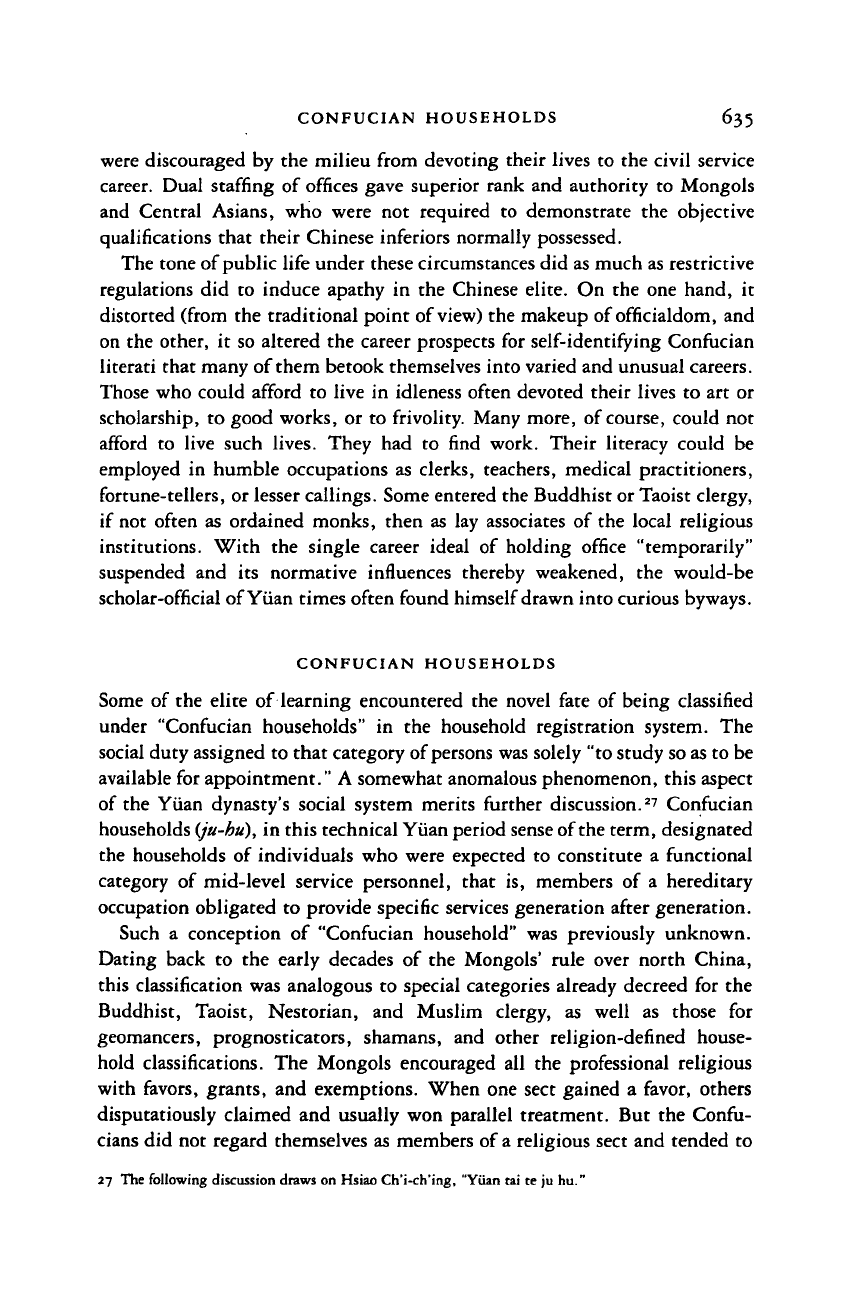
CONFUCIAN HOUSEHOLDS 635
were discouraged by the milieu from devoting their lives to the civil service
career. Dual staffing of offices gave superior rank and authority to Mongols
and Central Asians, who were not required to demonstrate the objective
qualifications that their Chinese inferiors normally possessed.
The tone of public life under these circumstances did as much as restrictive
regulations did to induce apathy in the Chinese elite. On the one hand, it
distorted (from the traditional point of view) the makeup of officialdom, and
on the other, it so altered the career prospects for self-identifying Confucian
literati that many of them betook themselves into varied and unusual careers.
Those who could afford to live in idleness often devoted their lives to art or
scholarship, to good works, or to frivolity. Many more, of course, could not
afford to live such lives. They had to find work. Their literacy could be
employed in humble occupations as clerks, teachers, medical practitioners,
fortune-tellers, or lesser callings. Some entered the Buddhist or Taoist clergy,
if not often as ordained monks, then as lay associates of the local religious
institutions. With the single career ideal of holding office "temporarily"
suspended and its normative influences thereby weakened, the would-be
scholar-official of Yiian times often found himself drawn into curious byways.
CONFUCIAN HOUSEHOLDS
Some of the elite of learning encountered the novel fate of being classified
under "Confucian households" in the household registration system. The
social duty assigned to that category of persons was solely "to study so as to be
available for appointment." A somewhat anomalous phenomenon, this aspect
of the Yiian dynasty's social system merits further discussion.
27
Confucian
households (ju-hu), in this technical Yiian period sense of the term, designated
the households of individuals who were expected to constitute a functional
category of mid-level service personnel, that is, members of a hereditary
occupation obligated to provide specific services generation after generation.
Such a conception of "Confucian household" was previously unknown.
Dating back to the early decades of the Mongols' rule over north China,
this classification was analogous to special categories already decreed for the
Buddhist, Taoist, Nestorian, and Muslim clergy, as well as those for
geomancers, prognosticators, shamans, and other religion-defined house-
hold classifications. The Mongols encouraged all the professional religious
with favors, grants, and exemptions. When one sect gained a favor, others
disputatiously claimed and usually won parallel treatment. But the Confu-
cians did not regard themselves as members of a religious sect and tended to
27 The following discussion draws on Hsiao Ch'i-ch'ing, "Yiian tai te ju hu."
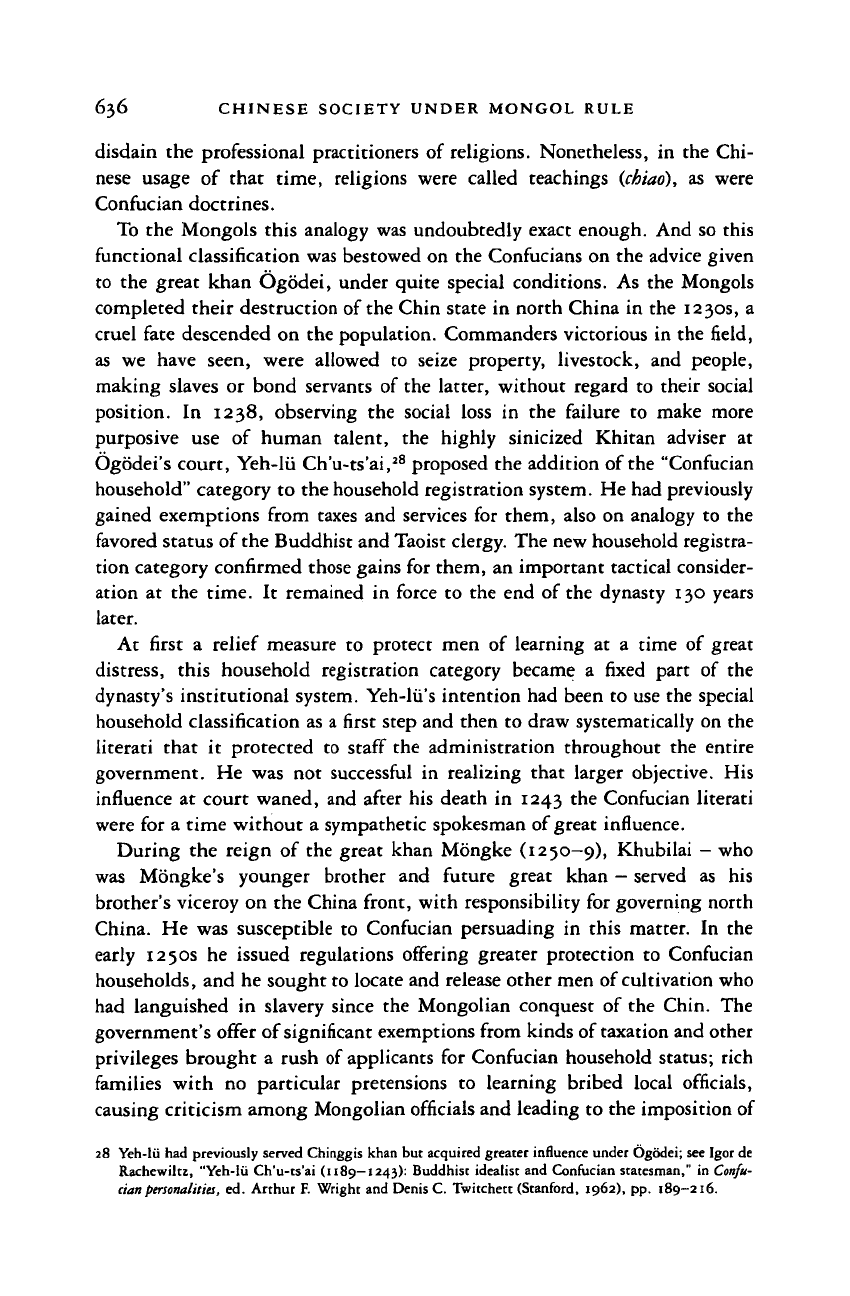
636 CHINESE SOCIETY UNDER MONGOL RULE
disdain the professional practitioners of religions. Nonetheless, in the Chi-
nese usage of that time, religions were called teachings
{chiao),
as were
Confucian doctrines.
To the Mongols this analogy was undoubtedly exact enough. And so this
functional classification was bestowed on the Confucians on the advice given
to the great khan Ogodei, under quite special conditions. As the Mongols
completed their destruction of the Chin state in north China in the 1230s, a
cruel fate descended on the population. Commanders victorious in the field,
as we have seen, were allowed to seize property, livestock, and people,
making slaves or bond servants of the latter, without regard to their social
position. In 1238, observing the social loss in the failure to make more
purposive use of human talent, the highly sinicized Khitan adviser at
Ogodei's court, Yeh-lii Ch'u-ts'ai,
28
proposed the addition of the "Confucian
household" category to the household registration system. He had previously
gained exemptions from taxes and services for them, also on analogy to the
favored status of the Buddhist and Taoist clergy. The new household registra-
tion category confirmed those gains for them, an important tactical consider-
ation at the time. It remained in force to the end of the dynasty 130 years
later.
At first a relief measure to protect men of learning at a time of great
distress, this household registration category became a fixed part of the
dynasty's institutional system. Yeh-lii's intention had been to use the special
household classification as a first step and then to draw systematically on the
literati that it protected to staff the administration throughout the entire
government. He was not successful in realizing that larger objective. His
influence at court waned, and after his death in 1243 the Confucian literati
were for a time without a sympathetic spokesman of great influence.
During the reign of the great khan Mongke (1250—9), Khubilai
—
who
was Mongke's younger brother and future great khan
—
served as his
brother's viceroy on the China front, with responsibility for governing north
China. He was susceptible to Confucian persuading in this matter. In the
early 1250s he issued regulations offering greater protection to Confucian
households, and he sought to locate and release other men of cultivation who
had languished in slavery since the Mongolian conquest of the Chin. The
government's offer of significant exemptions from kinds of taxation and other
privileges brought a rush of applicants for Confucian household status; rich
families with no particular pretensions to learning bribed local officials,
causing criticism among Mongolian officials and leading to the imposition of
28 Yeh-lii had previously served Chinggis khan but acquired greater influence under Ogodei; see Igor de
Rachewiltz, "Yeh-lii Ch'u-ts'ai (i 189-1243): Buddhist idealist and Confucian statesman," in Confu-
cian
personalities,
ed. Arthur F. Wright and Denis C. Twitchett (Stanford, 1962), pp. 189-216.
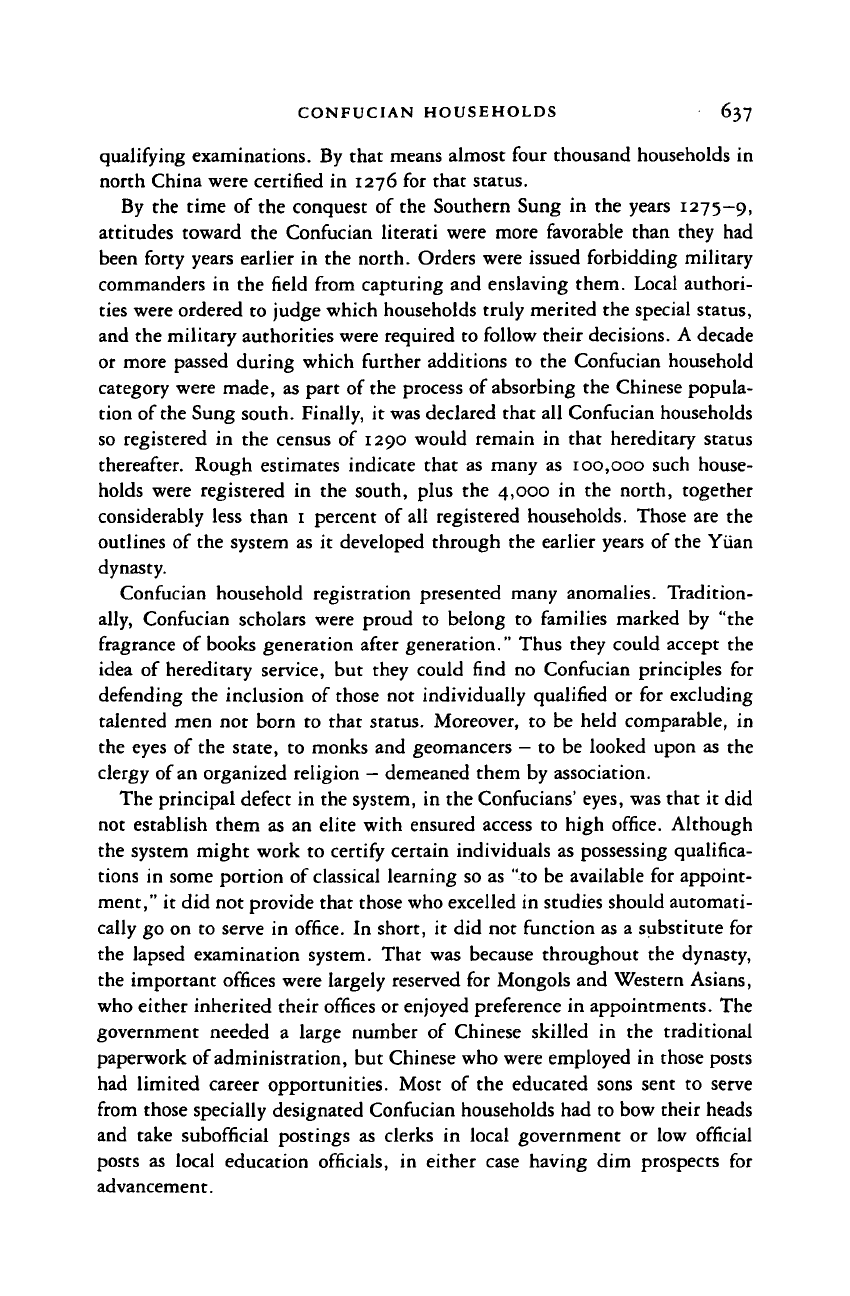
CONFUCIAN HOUSEHOLDS 637
qualifying examinations. By that means almost four thousand households in
north China were certified in 1276 for that status.
By the time of the conquest of the Southern Sung in the years 1275-9,
attitudes toward the Confucian literati were more favorable than they had
been forty years earlier in the north. Orders were issued forbidding military
commanders in the field from capturing and enslaving them. Local authori-
ties were ordered to judge which households truly merited the special status,
and the military authorities were required to follow their decisions. A decade
or more passed during which further additions to the Confucian household
category were made, as part of the process of absorbing the Chinese popula-
tion of the Sung south. Finally, it was declared that all Confucian households
so registered in the census of 1290 would remain in that hereditary status
thereafter. Rough estimates indicate that as many as 100,000 such house-
holds were registered in the south, plus the 4,000 in the north, together
considerably less than 1 percent of all registered households. Those are the
outlines of the system as it developed through the earlier years of the Yuan
dynasty.
Confucian household registration presented many anomalies. Tradition-
ally, Confucian scholars were proud to belong to families marked by "the
fragrance of books generation after generation." Thus they could accept the
idea of hereditary service, but they could find no Confucian principles for
defending the inclusion of those not individually qualified or for excluding
talented men not born to that status. Moreover, to be held comparable, in
the eyes of the state, to monks and geomancers - to be looked upon as the
clergy of an organized religion - demeaned them by association.
The principal defect in the system, in the Confucians' eyes, was that it did
not establish them as an elite with ensured access to high office. Although
the system might work to certify certain individuals as possessing qualifica-
tions in some portion of classical learning so as "to be available for appoint-
ment," it did not provide that those who excelled in studies should automati-
cally go on to serve in office. In short, it did not function as a substitute for
the lapsed examination system. That was because throughout the dynasty,
the important offices were largely reserved for Mongols and Western Asians,
who either inherited their offices or enjoyed preference in appointments. The
government needed a large number of Chinese skilled in the traditional
paperwork of administration, but Chinese who were employed in those posts
had limited career opportunities. Most of the educated sons sent to serve
from those specially designated Confucian households had to bow their heads
and take subofficial postings as clerks in local government or low official
posts as local education officials, in either case having dim prospects for
advancement.
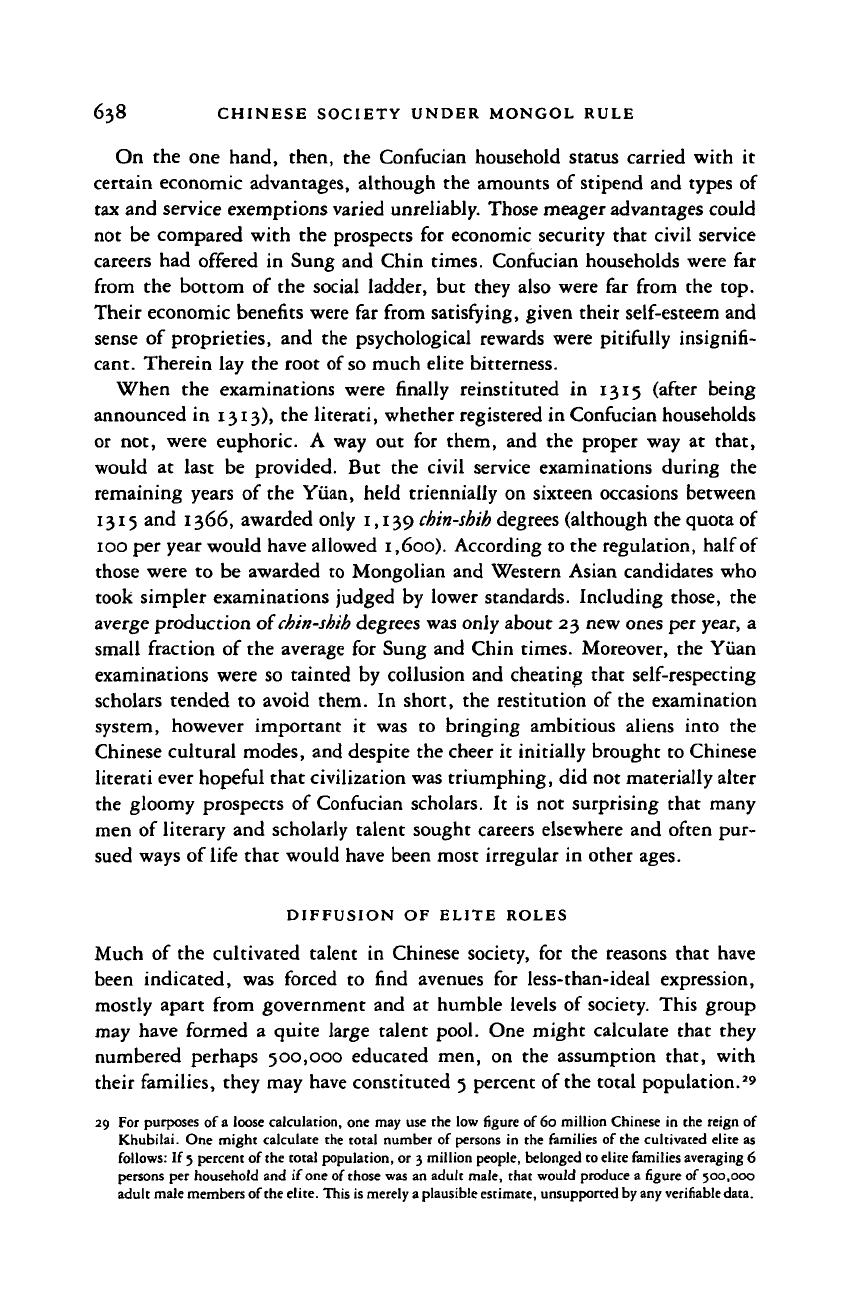
638 CHINESE SOCIETY UNDER MONGOL RULE
On the one hand, then, the Confucian household status carried with it
certain economic advantages, although the amounts of stipend and types of
tax and service exemptions varied unreliably. Those meager advantages could
not be compared with the prospects for economic security that civil service
careers had offered in Sung and Chin times. Confucian households were far
from the bottom of the social ladder, but they also were far from the top.
Their economic benefits were far from satisfying, given their self-esteem and
sense of proprieties, and the psychological rewards were pitifully insignifi-
cant. Therein lay the root of
so
much elite bitterness.
When the examinations were finally reinstituted in 1315 (after being
announced in 1313), the literati, whether registered in Confucian households
or not, were euphoric. A way out for them, and the proper way at that,
would at last be provided. But the civil service examinations during the
remaining years of the Yuan, held triennially on sixteen occasions between
1315 and 1366, awarded only 1,139
chin-shih
degrees (although the quota of
100 per year would have allowed
1,600).
According to the regulation, half of
those were to be awarded to Mongolian and Western Asian candidates who
took simpler examinations judged by lower standards. Including those, the
averge production oi
chin-shih
degrees was only about 23 new ones per year, a
small fraction of the average for Sung and Chin times. Moreover, the Yuan
examinations were so tainted by collusion and cheating that self-respecting
scholars tended to avoid them. In short, the restitution of the examination
system, however important it was to bringing ambitious aliens into the
Chinese cultural modes, and despite the cheer it initially brought to Chinese
literati ever hopeful that civilization was triumphing, did not materially alter
the gloomy prospects of Confucian scholars. It is not surprising that many
men of literary and scholarly talent sought careers elsewhere and often pur-
sued ways of life that would have been most irregular in other ages.
DIFFUSION OF ELITE ROLES
Much of the cultivated talent in Chinese society, for the reasons that have
been indicated, was forced to find avenues for less-than-ideal expression,
mostly apart from government and at humble levels of society. This group
may have formed a quite large talent pool. One might calculate that they
numbered perhaps 500,000 educated men, on the assumption that, with
their families, they may have constituted 5 percent of the total population.
29
29 For purposes of a loose calculation, one may use the low figure of 60 million Chinese in the reign of
Khubilai. One might calculate the total number of persons in the families of the cultivated elite as
follows: If
5
percent of the total population, or 3 million people, belonged to elite families averaging 6
persons per household and if one of those was an adult male, that would produce a figure of 300,000
adult male members of the elite. This is merely a plausible estimate, unsupported by any verifiable data.
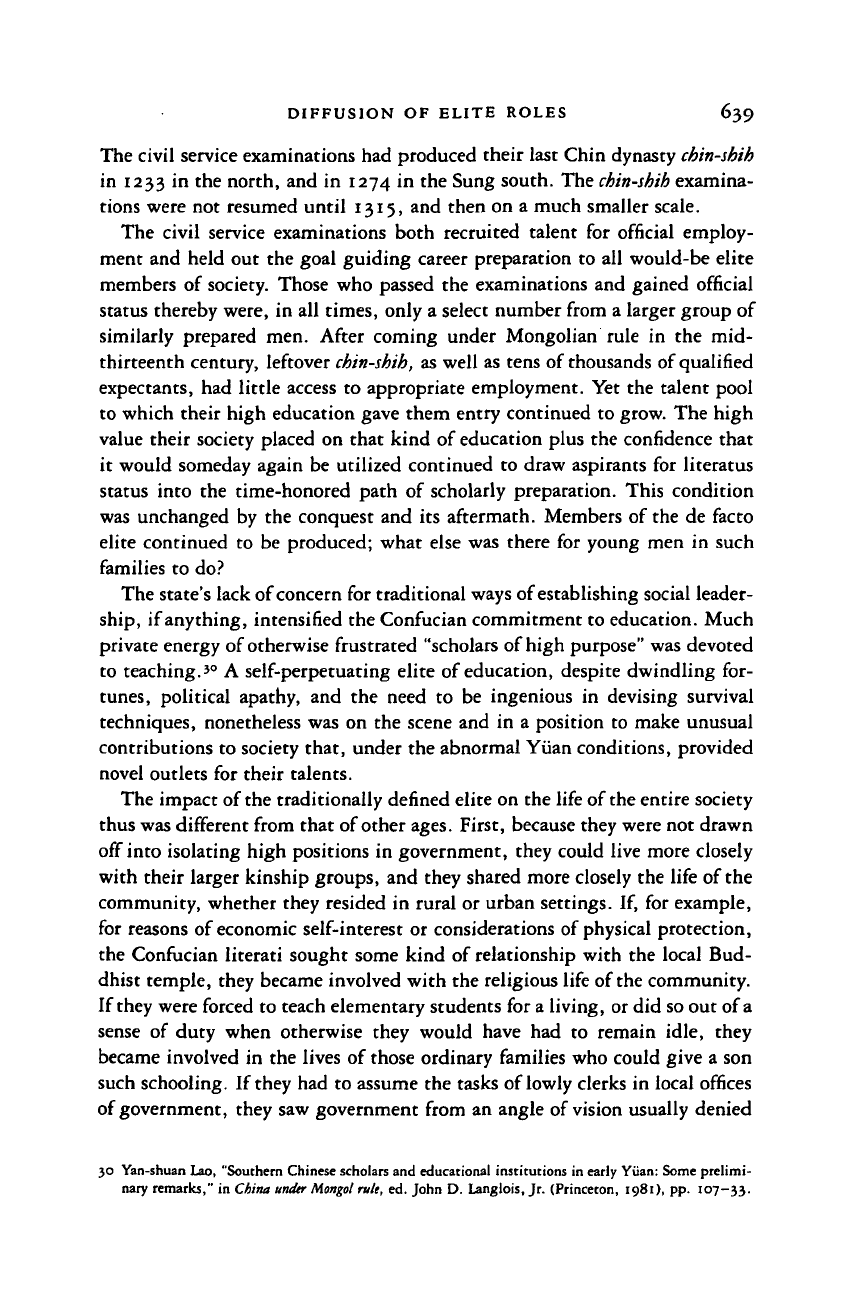
DIFFUSION OF ELITE ROLES 639
The civil service examinations had produced their last Chin dynasty chin-shih
in 1233
in
the north, and
in
1274
in
the Sung south. The
chin-shih
examina-
tions were
not
resumed until 1315, and then on
a
much smaller scale.
The civil service examinations both recruited talent
for
official employ-
ment and held
out
the goal guiding career preparation
to
all would-be elite
members
of
society. Those who passed
the
examinations and gained official
status thereby were,
in
all times, only
a
select number from
a
larger group of
similarly prepared men. After coming under Mongolian rule
in the mid-
thirteenth century, leftover chin-shih, as well as tens of thousands of qualified
expectants, had little access
to
appropriate employment. Yet the talent pool
to which their high education gave them entry continued to grow. The high
value their society placed
on
that kind
of
education plus the confidence that
it would someday again
be
utilized continued
to
draw aspirants
for
literatus
status into
the
time-honored path
of
scholarly preparation. This condition
was unchanged
by
the conquest
and its
aftermath. Members
of
the
de
facto
elite continued
to be
produced; what else was there
for
young men
in
such
families
to
do?
The state's lack of concern for traditional ways of establishing social leader-
ship,
if anything, intensified the Confucian commitment to education. Much
private energy of otherwise frustrated "scholars of high purpose" was devoted
to teaching.
30
A
self-perpetuating elite
of
education, despite dwindling
for-
tunes,
political apathy,
and the
need
to be
ingenious
in
devising survival
techniques, nonetheless was
on
the scene and
in a
position
to
make unusual
contributions to society that, under the abnormal Yuan conditions, provided
novel outlets
for
their talents.
The impact of the traditionally defined elite on the life of the entire society
thus was different from that of other ages. First, because they were not drawn
off into isolating high positions
in
government, they could live more closely
with their larger kinship groups, and they shared more closely the life of the
community, whether they resided
in
rural
or
urban settings.
If,
for example,
for reasons of economic self-interest
or
considerations
of
physical protection,
the Confucian literati sought some kind
of
relationship with
the
local Bud-
dhist temple, they became involved with the religious life of the community.
If they were forced
to
teach elementary students for a living, or did so out of a
sense
of
duty when otherwise they would have
had to
remain idle, they
became involved
in
the lives
of
those ordinary families who could give
a
son
such schooling.
If
they had
to
assume the tasks of lowly clerks
in
local offices
of government, they saw government from
an
angle
of
vision usually denied
30 Yan-shuan Lao, "Southern Chinese scholars and educational institutions in early Yiian: Some prelimi-
nary remarks,"
in
China
under
Mongol rule, ed. John
D.
Langlois, Jr. (Princeton, 1981), pp. 107-33.
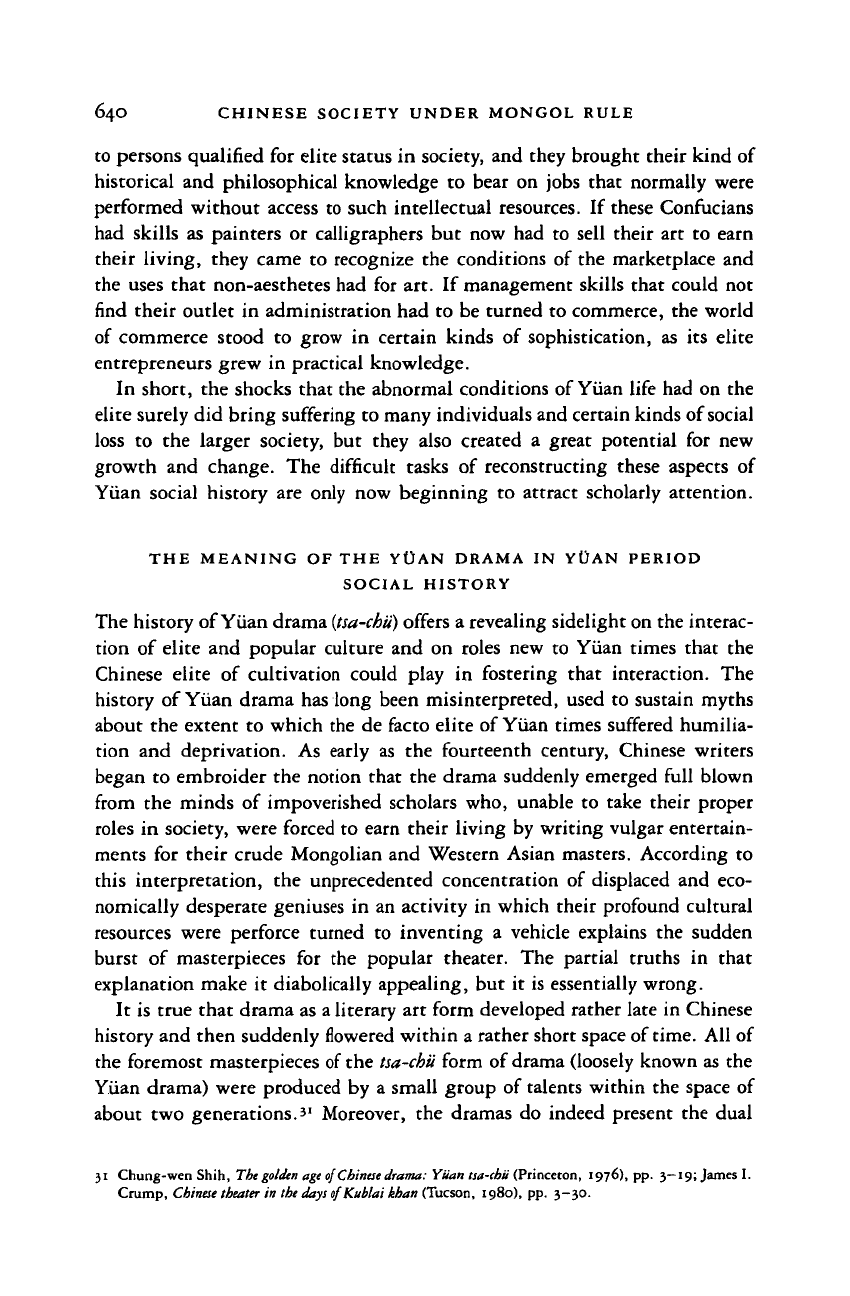
640 CHINESE SOCIETY UNDER MONGOL RULE
to persons qualified for elite status
in
society, and they brought their kind of
historical
and
philosophical knowledge
to
bear
on
jobs that normally were
performed without access to such intellectual resources.
If
these Confucians
had skills
as
painters
or
calligraphers
but
now had
to
sell their
art to
earn
their living, they came
to
recognize
the
conditions
of
the marketplace and
the uses that non-aesthetes had for art.
If
management skills that could not
find their outlet
in
administration had
to
be turned to commerce, the world
of commerce stood
to
grow
in
certain kinds
of
sophistication,
as its
elite
entrepreneurs grew in practical knowledge.
In short, the shocks that the abnormal conditions of Yuan life had on the
elite surely did bring suffering to many individuals and certain kinds of social
loss
to the
larger society,
but
they also created
a
great potential
for
new
growth
and
change.
The
difficult tasks
of
reconstructing these aspects
of
Yuan social history
are
only now beginning
to
attract scholarly attention.
THE MEANING OF THE YUAN DRAMA IN YUAN PERIOD
SOCIAL HISTORY
The history of Yiian drama
(tsa-chii)
offers a revealing sidelight on the interac-
tion
of
elite
and
popular culture and
on
roles new
to
Yiian times that
the
Chinese elite
of
cultivation could play
in
fostering that interaction.
The
history of Yiian drama has long been misinterpreted, used
to
sustain myths
about the extent
to
which the de facto elite of Yiian times suffered humilia-
tion
and
deprivation.
As
early
as the
fourteenth century, Chinese writers
began
to
embroider the notion that the drama suddenly emerged full blown
from
the
minds
of
impoverished scholars who, unable
to
take their proper
roles
in
society, were forced to earn their living by writing vulgar entertain-
ments
for
their crude Mongolian and Western Asian masters. According
to
this interpretation,
the
unprecedented concentration
of
displaced and eco-
nomically desperate geniuses
in
an activity
in
which their profound cultural
resources were perforce turned
to
inventing
a
vehicle explains
the
sudden
burst
of
masterpieces
for the
popular theater.
The
partial truths
in
that
explanation make
it
diabolically appealing, but
it
is essentially wrong.
It is true that drama as
a
literary art form developed rather late in Chinese
history and then suddenly
flowered
within a rather short space of
time.
All of
the foremost masterpieces of the
tsa-chii
form of drama (loosely known as the
Yuan drama) were produced
by
a small group
of
talents within the space of
about two generations.
31
Moreover,
the
dramas
do
indeed present the dual
31 Chung-wen Shih,
The golden age
of
Chinese
drama:
Yiian
tsa-chii
(Princeton, 1976), pp. 3-19; James
I.
Crump,
Chinese theater
in
the days
of
Kublai khan
(Tucson, 1980), pp.
3-30.
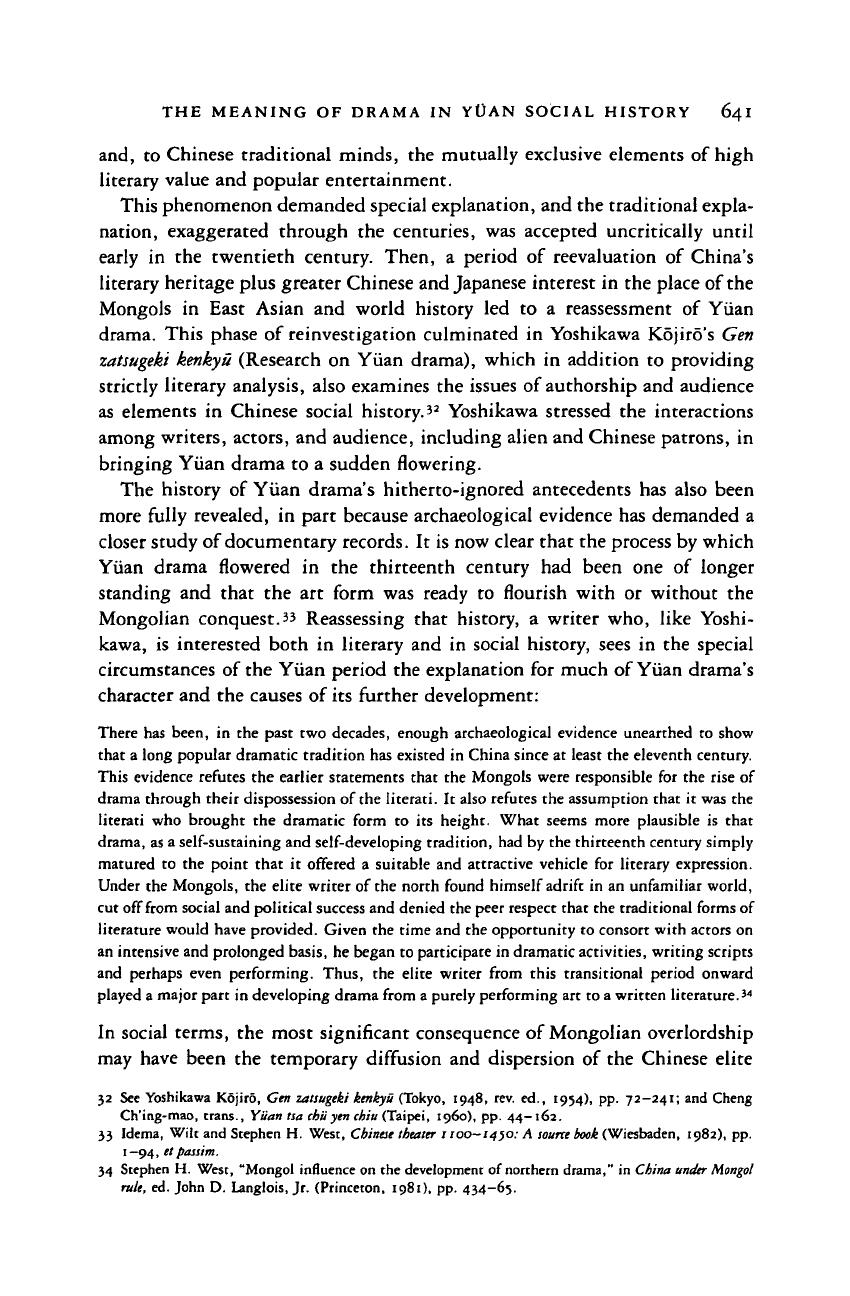
THE MEANING OF DRAMA IN Y0AN SOCIAL HISTORY 641
and,
to
Chinese traditional minds,
the
mutually exclusive elements
of
high
literary value
and
popular entertainment.
This phenomenon demanded special explanation,
and the
traditional expla-
nation, exaggerated through
the
centuries,
was
accepted uncritically until
early
in
the
twentieth century. Then,
a
period
of
reevaluation
of
China's
literary heritage plus greater Chinese
and
Japanese interest
in the
place
of
the
Mongols
in
East Asian
and
world history
led to a
reassessment
of
Yuan
drama. This phase
of
reinvestigation culminated
in
Yoshikawa Kojiro's
Gen
zatsugeki kenkyii (Research
on
Yuan drama), which
in
addition
to
providing
strictly literary analysis, also examines
the
issues
of
authorship
and
audience
as elements
in
Chinese social history.
32
Yoshikawa stressed
the
interactions
among writers, actors,
and
audience, including alien
and
Chinese patrons,
in
bringing Yuan drama
to
a
sudden flowering.
The history
of
Yuan drama's hitherto-ignored antecedents
has
also been
more fully revealed,
in
part because archaeological evidence
has
demanded
a
closer study
of
documentary records.
It is now
clear that
the
process
by
which
Yuan drama flowered
in the
thirteenth century
had
been
one
of
longer
standing
and
that
the art
form
was
ready
to
flourish with
or
without
the
Mongolian conquest.a Reassessing that history,
a
writer
who,
like Yoshi-
kawa,
is
interested both
in
literary
and in
social history, sees
in
the
special
circumstances
of the
Yuan period
the
explanation
for
much
of
Yuan drama's
character
and the
causes
of its
further development:
There
has
been,
in the
past
two
decades, enough archaeological evidence unearthed
to
show
that
a
long popular dramatic tradition
has
existed
in
China since
at
least
the
eleventh century.
This evidence refutes
the
earlier statements that
the
Mongols were responsible
for the
rise
of
drama through their dispossession
of
the literati.
It
also refutes
the
assumption that
it
was
the
literati
who
brought
the
dramatic form
to
its
height. What seems more plausible
is
that
drama, as
a
self-sustaining
and
self-developing tradition,
had by the
thirteenth century simply
matured
to the
point that
it
offered
a
suitable
and
attractive vehicle
for
literary expression.
Under
the
Mongols,
the
elite writer
of
the north found himself adrift
in an
unfamiliar world,
cut off from social
and
political success
and
denied the peer respect that
the
traditional forms of
literature would have provided. Given
the
time
and the
opportunity
to
consort with actors
on
an intensive and prolonged basis,
he
began
to
participate
in
dramatic activities, writing scripts
and perhaps even performing. Thus,
the
elite writer from this transitional period onward
played
a
major part
in
developing drama from
a
purely performing
art to a
written literature.
34
In social terms,
the
most significant consequence
of
Mongolian overlordship
may have been
the
temporary diffusion
and
dispersion
of the
Chinese elite
32 See Yoshikawa Kojiro, Gen zatsugeki kenkyu (Tokyo, 1948, rev. ed., 1954), pp.
72-241;
and Cheng
Ch'ing-mao, trans., Yiiati tsa
chii
yen
chiu (Taipei, i960), pp. 44-162.
33 Idema, Wilt and Stephen H. West, Cbinae
theater
1100—1450:
A
source book
(Wiesbaden, 1982),
pp.
1—94,
et
passim.
34 Stephen
H.
West, "Mongol influence on the development of northern drama,"
in
China
under Mongol
rule, ed. John D. Langlois, Jr. (Princeton, 1981), pp. 434—65.
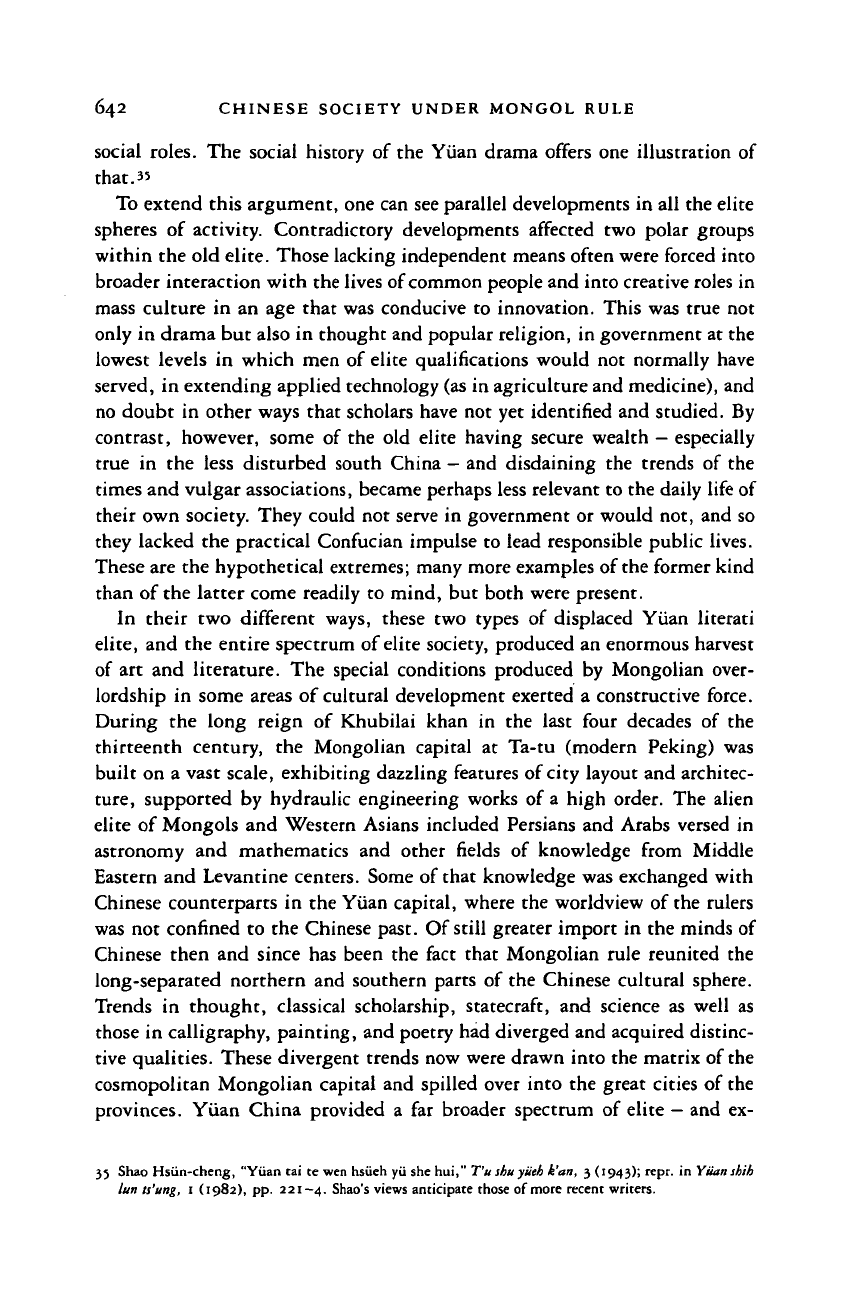
642 CHINESE SOCIETY UNDER MONGOL RULE
social roles. The social history of the Yuan drama offers one illustration of
that.
35
To extend this argument, one can see parallel developments in all the elite
spheres of activity. Contradictory developments affected two polar groups
within the old elite. Those lacking independent means often were forced into
broader interaction with the lives of common people and into creative roles in
mass culture in an age that was conducive to innovation. This was true not
only in drama but also in thought and popular religion, in government at the
lowest levels in which men of elite qualifications would not normally have
served, in extending applied technology (as in agriculture and medicine), and
no doubt in other ways that scholars have not yet identified and studied. By
contrast, however, some of the old elite having secure wealth - especially
true in the less disturbed south China - and disdaining the trends of the
times and vulgar associations, became perhaps less relevant to the daily life of
their own society. They could not serve in government or would not, and so
they lacked the practical Confucian impulse to lead responsible public lives.
These are the hypothetical extremes; many more examples of
the
former kind
than of the latter come readily to mind, but both were present.
In their two different ways, these two types of displaced Yuan literati
elite,
and the entire spectrum of elite society, produced an enormous harvest
of art and literature. The special conditions produced by Mongolian over-
lordship in some areas of cultural development exerted a constructive force.
During the long reign of Khubilai khan in the last four decades of the
thirteenth century, the Mongolian capital at Ta-tu (modern Peking) was
built on a vast scale, exhibiting dazzling features of city layout and architec-
ture,
supported by hydraulic engineering works of a high order. The alien
elite of Mongols and Western Asians included Persians and Arabs versed in
astronomy and mathematics and other fields of knowledge from Middle
Eastern and Levantine centers. Some of that knowledge was exchanged with
Chinese counterparts in the Yuan capital, where the worldview of the rulers
was not confined to the Chinese past. Of still greater import in the minds of
Chinese then and since has been the fact that Mongolian rule reunited the
long-separated northern and southern parts of the Chinese cultural sphere.
Trends in thought, classical scholarship, statecraft, and science as well as
those in calligraphy, painting, and poetry had diverged and acquired distinc-
tive qualities. These divergent trends now were drawn into the matrix of the
cosmopolitan Mongolian capital and spilled over into the great cities of the
provinces. Yuan China provided a far broader spectrum of elite
—
and ex-
35 Shao Hsiin-cheng, "Yuan tai te wen hsiieh yii she hui," T'u
shu yiieh
k'an, 3 (1943); repr. in Yuan shih
lun ts'ung, 1 (1982), pp. 221—4. Shao's views anticipate those of more recent writers.
